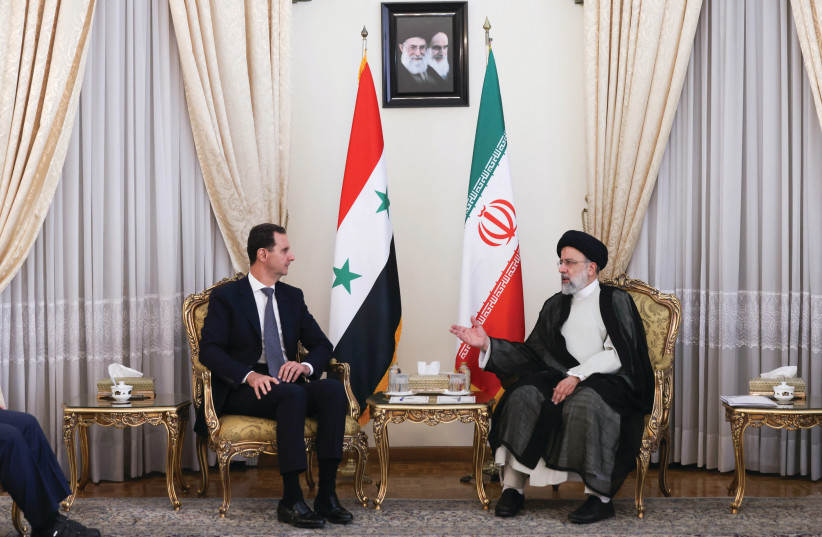Syrians react to Assad’s return to Arab League
Syrian President Bashar Assad arrived in Jeddah, Saudi Arabia on Thursday to attend his first Arab League summit in 13 years, signaling regional reintegration after more than a decade of war.
The scene of Assad’s plane landing in Saudi Arabia to a gracious greeting by top officials was unheard of just a year ago, when Riyadh, Doha, and several other Arab capitals severed diplomatic ties with Damascus and helped finance and arm opposition groups to topple him.
After 12 years of a deadly civil war that killed more than 500,000, wounded hundreds of thousands more, and left millions as refugees and displaced, Syrians at home and abroad seem ambivalent about the Arab states’ re-acceptance of Assad.
Assad arrived in Jeddah, Saudi Arabia last week to attend the Arab League Summit at the official invitation of Saudi King Salman bin Abdulaziz. This invitation, which ushers in the end of Assad’s extended diplomatic isolation, can be seen as a failure of his opponents to remove him over the course of the civil war and a victory in legitimacy for Assad.
The move sparked controversy and massive reactions among Syrians. Washington, however, said it did “not believe that Syria merits readmission to the Arab League.”
 IRAN’S PRESIDENT Ebrahim Raisi meets with Syrian President Bashar Assad in Tehran, earlier this month. (credit: OFFICIAL PRESIDENTIAL WEBSITE / REUTERS)
IRAN’S PRESIDENT Ebrahim Raisi meets with Syrian President Bashar Assad in Tehran, earlier this month. (credit: OFFICIAL PRESIDENTIAL WEBSITE / REUTERS)“We are not going to normalize relations with the Assad regime, and we certainly don’t support others doing that as well,” State Department spokesman Vedant Patel recently told reporters in Washington.
Assad has been extended a lifeline, and a golden opportunity to slowly reintegrate into the international community as he normalizes diplomatic ties with the same Arab governments that expelled him in 2012.
Lebanese writer Dalal al-Bizri criticized the Arab League’s invitation of Assad in the pan-Arab news site Alaraby Aljadeed, writing that “there is a defect in this League: to boycott Bashar Assad because of his killing of the Syrian people, and to bring him back after more than a decade of perseverance in killing them.”
Reactions to Assad’s invitation to the League summit
Some Syrians expressed their anger at Assad’s invitation, contending that his attendance at the League summit amounts to the legitimizing of a “killer regime,” ending the international isolation of the brutal dictator responsible for millions of dead and displaced.
Syrian citizen Khodor Mustafa is disappointed in the decision to admit Assad, telling The Media Line that the world has “forgotten” his country’s pain and the just demands of its people.
“They don’t care anymore; we are a burden on the world, and this is how they think they will turn the page and eliminate us,” he said. “But I promise we will not relent.”
Syrian journalist Omar Madaniah called Assad a “criminal,” writing in a tweet: “The opening session of the Arab summit should begin with this video so that Bashar Assad can be proud of his thugs who torture the Syrians.”
Fadi, a Syrian journalist based in Berlin, Germany, tweeted a harsh message to the Arab League and the world.
“There is no political, economic, or human benefit from receiving the criminal Bashar Assad in Saudi Arabia and normalizing relations with his criminal regime,” he wrote. “It is just a moral downfall, political subjugation, and further betrayal of the Syrian people. Even if the world, East and West, gathers to recycle the garbage represented by the Assad regime, Assad will remain the greatest dictator, serial killer, criminal and drug dealer in the world.”
لا فائدة سياسية ولا اقتصادية ولا إنسانية من استقبال المجرم بشار الأسد في السعودية وتطبيع العلاقات مع نظامه المجرم، هو مجرّد سقوط أخلاقي وانبطاح سياسي ومزيد من الخذلان للشعب السوري، حتى لو اجتمع العالم بشرقه وغربه على إعادة تدوير القمامة المتمثلة بنظام الأسد، سيبقى الأسد أكبر… pic.twitter.com/LK2CVNwquV
— Fadi فادي (@fadi0bed) April 2, 2023
Meanwhile, others say that Assad’s presence at the summit and readmission into the Arab world do not mean that the “revolution” against him should cease. On the contrary, says Maher, a resident of Aleppo, who asked The Media Line to be identified only by his first name.
After years of gridlock in the war, Assad’s government has a secure grip on most of the country, particularly Syria’s largest cities, while opposition groups or US-supported Kurdish forces control most of northern and eastern Syria. The invitation by the Arab League, while significant, does not guarantee progress on resolving Syria’s brutal war.
The Arab League, founded in 1945 to promote regional cooperation, includes 22 member states. It is widely seen as toothless and has long struggled to help solve Arab conflicts.
Arab governments that saw collective action to sever ties with Assad as the best hope for ending the bloody civil war are now changing course.
Yet some Syrians maintain that the normalization could lift the country out of its misery.
“We have major problems—electricity, fuel shortages, and rising food prices. I hope for the sake of the country this will result in enhancing most basic services, and help our currency and bring prices down,” Damascus shopkeeper Namir told The Media Line.
“I’m a bit optimistic and I think this will help a little bit in bringing peace to our country,” added Abir, a 29-year-old university student in Damascus.





Comments are closed.